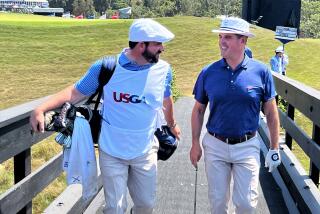Hope Goes to Wadkins on 95th Hole
- Share via
PALM DESERT — If Craig Stadler and Lanny Wadkins had been playing in the U. S. Open on Sunday at Indian Wells, their match would be talked about as long as golf is played. As it was, Wadkins’ 20-foot birdie putt to win on the fifth extra hole of the Bob Hope Classic ended what was one of the most memorable head-to-head final rounds in modern history. “Somebody had to win, and somebody didn’t, and he did,” said a dejected Stadler, who played 23 holes without a bogey only to see a four-stroke lead dissipate in the wake of Wadkins’ stirring comeback when he played the final five holes in five-under par. “When you shoot 66 with a one-shot lead, it takes a good round to beat you and Lanny had a heck of a finish,” said Stadler after playing the final five holes in one-under par--and still losing four strokes. When the final round of the 90- (later to become 95-) hole marathon started, both of them came out firing birdies. Wadkins shot 32-33--65 and Stadler 31-35-66. Before the tournament ended in near darkness, the Ryder Cup partners had made 14 birdies and 2 eagles. And Stadler had made more escapes than Houdini. Both broke the Hope tournament scoring record by two strokes in finishing 27 below par at 333 in five rounds over the Indian Wells, Bermuda Dunes, Tamarisk and La Quinta courses. Wadkins: 67-67-68-66-65, plus two birdies in five extra holes, for $90,000. Stadler: 66-68-64-69-66, plus one birdie in overtime, for $54,000. “Craig and I just ran the tables,” said the 35-year-old Wadkins, who ranked his win--No. 13 in 13 years on the tour--only slightly behind his playoff win in the 1977 PGA at Pebble Beach against Gene Littler. It was like a match-play tournament as Stadler and Wadkins were waging their private war so far ahead of the pack that it seemed there was no one else around. Nearly everyone in the crowd of 25,700 seemed to be running and chasing after the final threesome. “It got kind of scary out there,” Wadkins said. “We almost got run over by the gallery a couple of times, but they were having a good time and I think we were giving them a good show.” It was such a two-man show that even Ron Streck, who shot a 70 while playing with them in the final threesome, seemed a bit player lost in the drama. Hubert Green, who won the Hope in 1974, shot a 65 to finish in third place at 340. Streck was next at 341. The end came on the 15th hole, a 163-yard par 3 that Stadler and Wadkins played three times Sunday. The difference in the day, perhaps, was that Wadkins birdied it twice and Stadler was fortunate to escape with pars each time he played it. Wadkins, hitting first, put a 6-iron shot 20 feet from the hole. Stadler, also using a 6-iron, pushed his shot to the right of the green, just beyond a bunker from where he had escaped moments earlier. Stadler chipped up short, but never had to putt as Wadkins drilled home his birdie winner. “I don’t know what it is about that hole,” Stadler said. “There’s something about it that seems to make me push the ball to the right. I played it four times (once last Thursday and three times Sunday) and had the same results each time. Twice I was in the bunker and twice I was to the right, in the rough.” Wadkins appeared to have the playoff won a hole earlier, on the 501-yard 18th, only to see Stadler make a birdie from a seemingly impossible situation. Stadler, who had problems controling his tee shots most of the afternoon, pushed his drive to the right of the fairway. The ball was sitting beneath a tumbleweed, but because it was still rooted, it could not be moved. Taking a massive swing that would have done justice to a blacksmith, Stadler clawed through the thick grass with a pitching wedge--picking up grass, ball and weed and hurling the whole mess toward the fairway. When someone asked Stadler if the weed was rooted, he said: “Not now, it isn’t. It won’t be in anyone’s way next year.” Wadkins, after a 280-yard tee shot, ripped a 4-wood the final 221 yards to the green, only eight feet from a possible eagle. Even after his amazing shot from the rough, Stadler was still 155 yards from the green, knowing his rival was only eight feet away. The burly former USC All-American hit what appeared to be a perfect shot, but the ball failed to clear a rise in the green and rolled back, about 13 feet short of the cup. Stadler’s putt went unerringly into the back of the cup for a most remarkable birdie. Wadkins, knowing he could win by sinking his putt, left it out to the right. It was one of the few putts he missed all day. Earlier, on the same hole in regulation play, he had hit a driver and 2-iron to the green and taken two putts for a birdie that sent the match into overtime. “I was very proud of my two shots at 18 both times. I had exactly 221 yards to the hole for both of them. In regulation play, it was warmer, and I hit a 2-iron. In the playoff, it was cooler and the wind had died down, so I used a 4-wood and hit it better than I did the 2-iron.” Wadkins, after making what he called an “NBC bogey” on No. 13, started his victory drive with an eagle on No. 14. “I missed the green to the right on the (par 3) 13th and I couldn’t get the NBC guy there to keep quiet,” complained Wadkins. “They shouldn’t make that much racket anyway, and then he wouldn’t stop. I hit a terrible chip and took my bogey.” (NBC may have also incurred the wrath of many television viewers. Many portions of the country didn’t get to see the finish. NBC’s live coverage to the East was cut off at the conclusion of regulation play.
(Tom Merritt, a spokesman for NBC Sports, said, “We’re sorry for it, but that’s just the nature of this business. It’s pretty much standard operating procedure. We had time cleared for the golf from 4 o’clock until 6:30 (EST) and then we had another half hour that we could clear for a playoff.”)
Wadkins’ bogey put him four shots behind Stadler, who had chipped in for an eagle 3 on the 517-yard fifth hole en route to a front nine 31. “I knew I had second place at the time and I could have chunked it in and played for second, but it never entered my mind,” Wadkins said. “I figured I’d go at him and see what happened. I hit two great shots at 14 and even though he made a birdie on the same hole, it gave me a lift and kind of turned the momentum on my side.” Wadkins hit back-to-back 4-woods and the second one cozied up three feet from the hole for the eagle. After a par at No. 15, he finished with three birdies. He sank a 15-foot putt after a sand wedge second shot on the 354-yard 16th, and sank a 10-footer after a pitching wedge on the 398-yard 17th. Then came the driver, 2-iron to the green at No. 18 and two putts to tie. Wadkins needed some escape magic of his own on the third extra hole when he plugged his second shot in a sand trap. “I hit a wedge from the fairway and when the ball was in the air, I thought it was going to be stiff. I couldn’t believe it when it hit the bunker.” Wadkins, using a pitching wedge instead of a sand wedge, hit an exceptional shot from the trap. The ball plopped up and dropped down near the hole to save par. “I have my own technique for plugged balls in the sand,” said Wadkins. “Most guys hood their sand wedge, but I use a pitching wedge with an open face. It’s something I’ve been doing since my amateur days and I’ve had good success with it.” The win was Wadkins’ first in the U.S. since the 1983 Tournament of Champions, although he won the Nissan World Championships last fall in Japan. “I gained a lot of confidence in Japan,” he said. “I started the final round two shots back of Seve Ballesteros and Tom Watson and shot a 63 to win by four. When you beat fellows like that, it doesn’t matter if you’re in Japan or the United States. It’s a great feeling. “But I wanted to win this one badly because I wanted to get back in the Tournament of Champions at La Costa. I’ve won there two times in the last three years.” Wadkins said he still has no plans to play in the Las Vegas Panasonic tournament in March where he would win a $250,000 bonus if he wins there--but he did tell tournament director Jim Cook that he “might change his mind.” The $90,000 he won Sunday has already been spoken for. “Winning means my wife, Penny, will have a lot more fun on Rodeo Drive. when we get to Los Angeles than she would have had,” he said.
More to Read
Go beyond the scoreboard
Get the latest on L.A.'s teams in the daily Sports Report newsletter.
You may occasionally receive promotional content from the Los Angeles Times.










